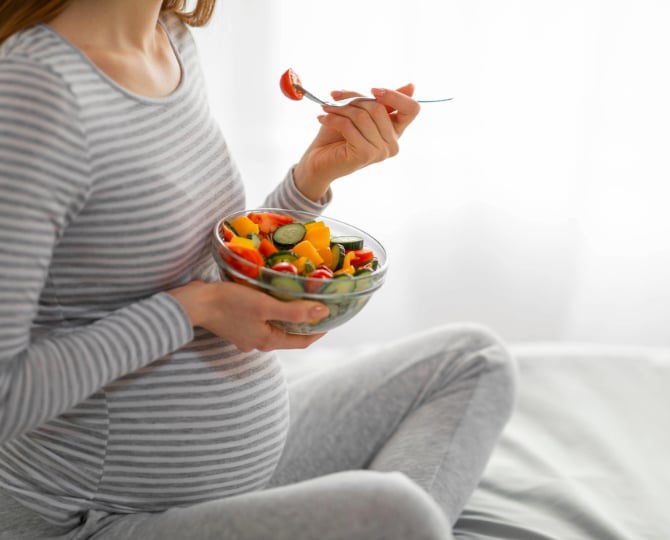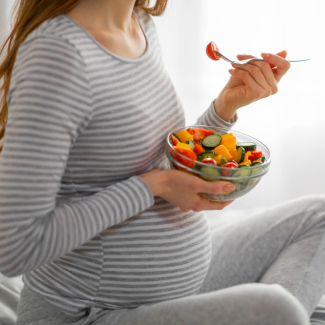Being pregnant and preparing for childbirth is both a privilege and a huge responsibility that comes with its own set of challenges—nutrition being one of them. Eating well is key role to keeping moms-to-be healthy and supporting baby’s development. Women require more of certain nutrients during this time, and a well-rounded diet can help meet those needs.
Essential nutrients during pregnancy
During pregnancy, nutritional needs increase—in quantity, yes, but even more so in quality. In terms of macronutrients, expectant mothers need more carbohydrates (175 g), protein (1.1 g per kg of body weight) and dietary fibre (28 g) (9) every day.
As for micronutrients, the table below compares the recommended intake for pregnant versus non-pregnant women and lists examples of foods that are good sources of each (4, 5, 8, 9, 10).
| Nutrient | Role | Non-pregnant woman | Pregnant woman | Sources |
| Folic acid (folate, vitamin B9) | Helps prevent neural tube defects and supports formation of baby’s new tissues | 400 μg | 600 μg | Flour, enriched pasta, orange fruits, dark green vegetables, sunflower seeds, legumes |
| Vitamin B12 | Supports red blood cell production and baby’s nervous system development | 2.4 μg | 2.6 μg | Meat, fish, seafood, eggs, milk, fortified plant-based drinks, nutritional yeast |
| Vitamin A | Supports cell division, immune function, and baby’s vision development | 700 μg | 770 μg (750 μg ≤ 18 years) | Orange vegetables and fruits, dairy products, eggs, fish, seafood |
| Vitamin C | Supports the immune system and iron absorption | 75 mg (65 mg ≤ 18 years) | 85 mg (80 mg ≤ 18 years) | Vegetables, fruits |
| Iron | Supports fetal and placental growth, oxygen transportation, and baby’s iron reserves for the first 6 months | 18 mg (15 mg ≤ 18 years) | 27 mg | Red meat, poultry, fish, seafood, legumes, breakfast cereals, enriched whole grains, tofu, green vegetables |
| Omega-3 | Supports fetal brain development | 1.1 g | 1.4 g | Fatty fish (salmon, mackerel, sardines), canola oil, ground flaxseed or chia seeds, walnuts |
Some nutrient requirements don’t change during pregnancy, like calcium (1,000 mg for adults, 1,300 mg for those 18 and under) and vitamin D (600 IU) (8, 10). Health Canada recommends taking a daily multivitamin with at least 400 μg of folic acid, 16–20 mg of iron, and a minimum of 400 IU of vitamin D (6).
Food to avoid during pregnancy
Some foods should be avoided entirely during pregnancy, like alcohol, while others—such as caffeine (limit to under 300 mg per day) and certain fish—should be consumed in moderation (1). To lower the risk of listeriosis, it’s also best to avoid some deli meats and cheeses (3).
To check if a cheese is safe to eat, you can calculate its moisture content with the following formula:
% moisture ÷ (100 - % fat)
If the result is below 62%, the cheese is considered safe during pregnancy. Toxoplasmosis is another concern for pregnant women. This parasite can be passed to the baby through the placenta and can increase the risk of miscarriage, stillbirth, vision problems, and developmental delays (2).
The following precautions should be taken to reduce exposure through food (2, 3):
- Cook meat thoroughly: 63 °C (145 °F) for whole cuts, 71 °C (160 °F) for ground meat, and 74 °C (165 °F) for ground poultry.
- Wash fruits and vegetables well.
- Drink treated water.
- Avoid raw oysters, mussels, and clams, as they may contain seawater.
Nutritional advice during pregnancy
With all the nutritional challenges pregnancy brings, it’s important to adopt healthy eating habits and stick to a regular meal schedule. Pregnant women are encouraged to eat three meals a day, with healthy snacks in between to meet their increased needs—especially during the second and third trimesters. At this stage, most women need two to three extra servings of food per day to meet their energy and protein requirements (7). They should focus on whole, nutrient-rich foods like vegetables, fruits, whole grains, plant and animal protein, fish, dairy products, and unsaturated fats (9). Staying hydrated is just as important, with recommended fluid intake around 3 litres per day, including water and other drinks (9). Good nutrition plays a key role during this critical period and is essential to supporting the mother’s well-being and the baby’s healthy development.
Conclusion
Every pregnancy is unique, so it’s important that recommendations for expectant mothers be tailored to their specific needs and issues. Whether it’s managing nausea, acid reflux, or gestational diabetes, personalized nutritional advice plays a key role in supporting the health of moms-to-be and helping their babies grow.
References:
- Alima. Foods to avoid during pregnancy (French only), accessed online, https://centrealima.ca/media/rvdpd2jv/fiches-alimentsrisque_alima_2024.pdf
- Canadian Centre for Occupational Health and Safety. Toxoplasmosis (2025), accessed online, https://www.ccohs.ca/oshanswers/diseases/toxoplasmosis.html
- Institut national de santé publique du Québec (INSPQ). Preventing food-borne infections, accessed online, https://www.inspq.qc.ca/en/tiny-tot/pregnancy/nutrition-during-pregnancy/preventing-food-borne-infections
- Naître et grandir. Vitamins and minerals during pregnancy (2019), accessed online, https://naitreetgrandir.com/en/pregnancy/health-well-being/vitamins-minerals-pregnancy/
- World Health Organization (WHO). Vitamin A supplementation in pregnant women (2011), accessed online, https://iris.who.int/bitstream/10665/44625/1/9789241501781_eng.pdf
- Health Canada. Nutrition considerations during pregnancy and to support breastfeeding (2022), accessed online, https://food-guide.canada.ca/en/applying-guidelines/nutrition-considerations-during-pregnancy-support-breastfeeding/?overridden_route_name=entity.node.canonical&base_route_name=entity.node.canonical&page_manager_page=node_view&page_manager_page_variant=node_view-panels_variant-0&page_manager_page_variant_weight=0
- Health Canada. Prenatal Nutrition Guidelines for Health Professionals: Gestational Weight Gain (2010), https://www.canada.ca/content/dam/hc-sc/migration/hc-sc/fn-an/alt_formats/pdf/nutrition/prenatal/ewba-mbsa-eng.pdf
- Health Canada. Dietary reference intakes tables: Reference values for elements (2023), accessed online, https://www.canada.ca/en/health-canada/services/food-nutrition/healthy-eating/dietary-reference-intakes/tables/reference-values-elements.html
- Health Canada. Dietary reference intakes tables: Reference values for macronutrients (2023), accessed online, https://www.canada.ca/en/health-canada/services/food-nutrition/healthy-eating/dietary-reference-intakes/tables/reference-values-macronutrients.html
- Health Canada. Dietary reference intakes tables: Reference values for vitamins (2023), accessed online, https://www.canada.ca/en/health-canada/services/food-nutrition/healthy-eating/dietary-reference-intakes/tables/reference-values-vitamins.html
This article provides general information only and does not replace the recommendations or care of a health professional.

